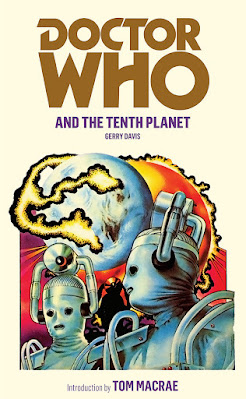Doctor Who and the Tenth Planet by Gerry Davis
This was the first novelisation to feature the first Doctor after Target brought back the books in the 1970s. Doctor Who books are a different thing now; while each of the first three novels essentially stood on its own, now it's a range. These things are being pumped out (approximately) every other month in early 1976, and soon it will be one every month. Now there's a sense of completism to it all, I think. We had the first first Doctor story (sort of anyway), so the gap that needs to be plugged is we don't have the last first Doctor story. How do we get from William Hartnell to Tom Baker? This is a necessary part of that chain. (Though the first second Doctor story wouldn't come along for more than fifteen years!)
 |
| Originally published: 1976 Acquired: November 2013 Read: July 2024 |
To me, the book was qualitatively different from the previous three I've read so far. When it came to The Daleks (1964), The Zarbi (1965), The Crusaders (1966), it seemed to me they'd all been designed to work as a book first and foremost. Especially The Daleks and The Crusaders, you could pick them up and know nothing of the television program and be satisfied, I think; The Zarbi not as much, but as I discussed, Bill Strutton is definitely trying to operate in the same space as The Daleks.
But for the first time, The Tenth Planet is clearly not a novel but a novelisation. It is designed to plug a gap in your viewing of the television programme. That is to say, I don't think there's really that much going on here. We get the scripts on the page, but no sense of character, no sense of atmosphere. The Doctor and his companions almost feel lost in this, observers to the arrival of Mondas at Earth. I know there are constraints here from the story as produced, but it feels like the Doctor is barely even in this book.
This is a doubly momentous event in Doctor Who history—the first Cyberman story, the first (what would eventually be called) regeneration story—but nothing about it as rendered by Gerry Davis feels momentous. Basically a bunch of people hang about in a space center talking about stuff. I could see how this material would come to life on screen with some good acting and direction (it has been a long time since I watched The Tenth Planet, so I don't really remember if it gets that or not), but it never comes alive on the page. I found this a plod in a way that was not true of the three previous books.
It has its fun bits like any novelisation. The afterword points out a nice emphasis on the Doctor's hands that foreshadow what will happen to him. We get a different potted history of the Cybermen than has become accepted (they originated on Telos and moved to Mondas here, which to be honest makes a kind of nonsensical story even less plausible). The date of the story is moved from 1986 to 2000, and the origin of Ben and Polly is moved from 1966 to about 1974. In modern novelisations, I feel like an author's added details are often about smoothing out consistency issues; I kind of like that Gerry Davis just went around causing more problems!
Every three months, I read the unread Doctor Who book I've owned the longest. Next up in sequence: Doctor Who and the Dalek Invasion of Earth
No comments:
Post a Comment